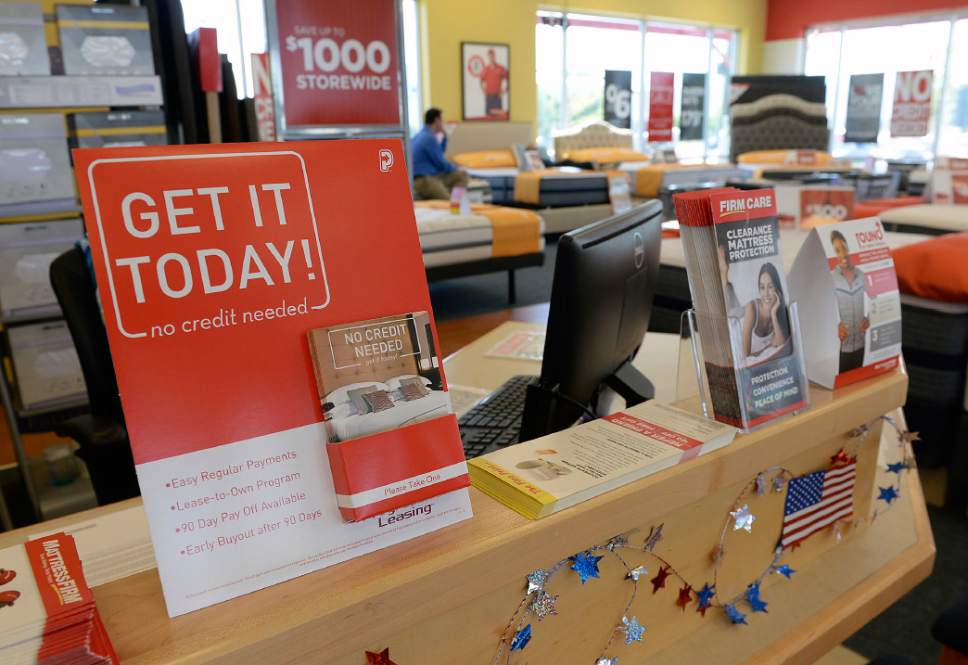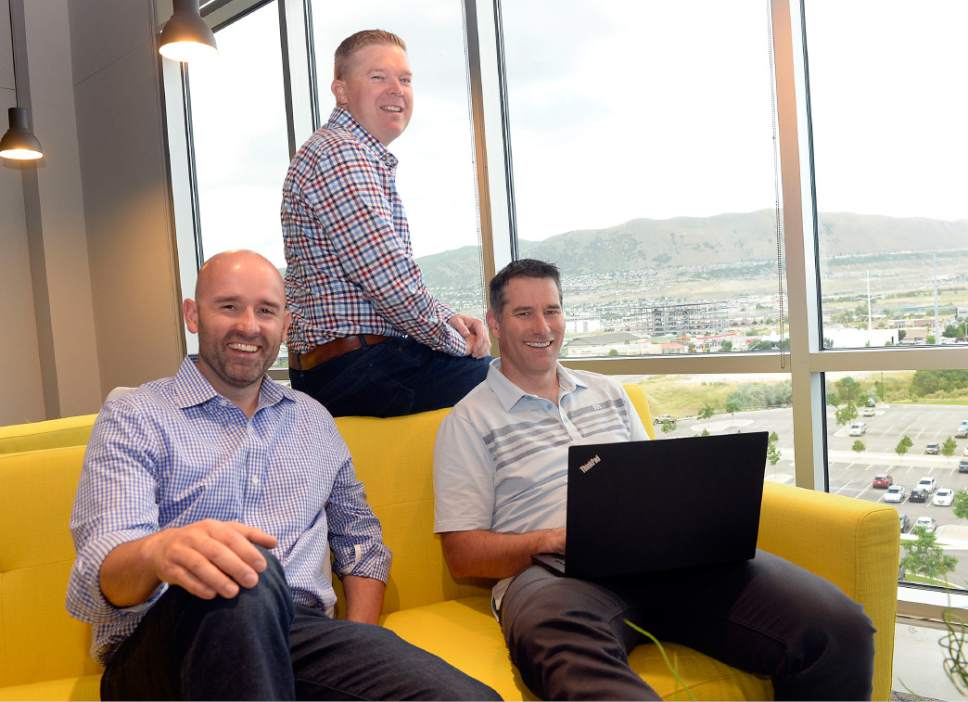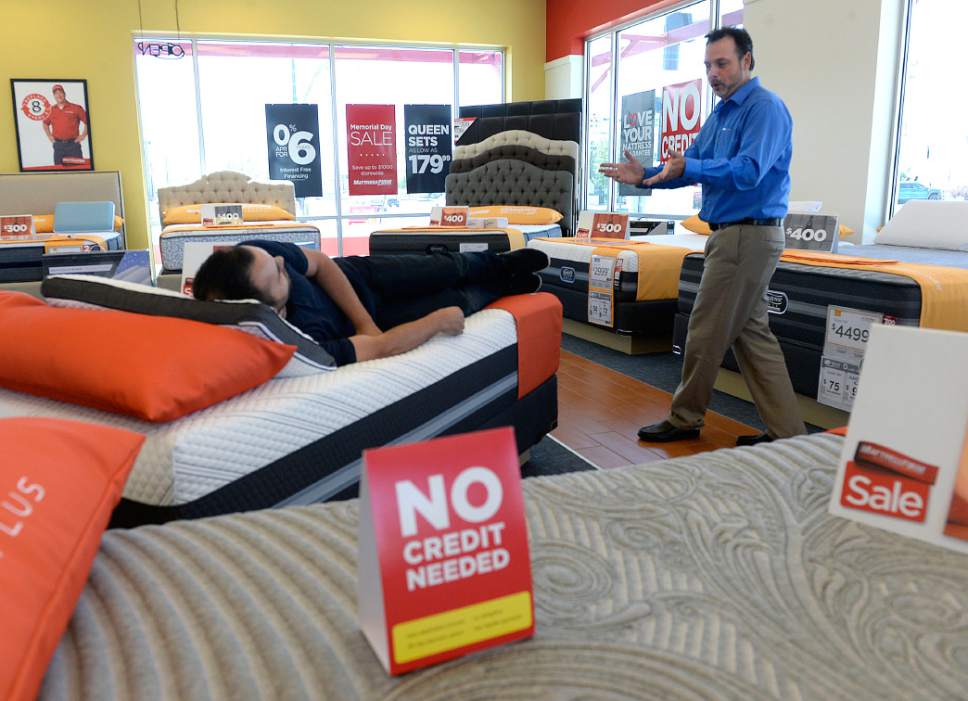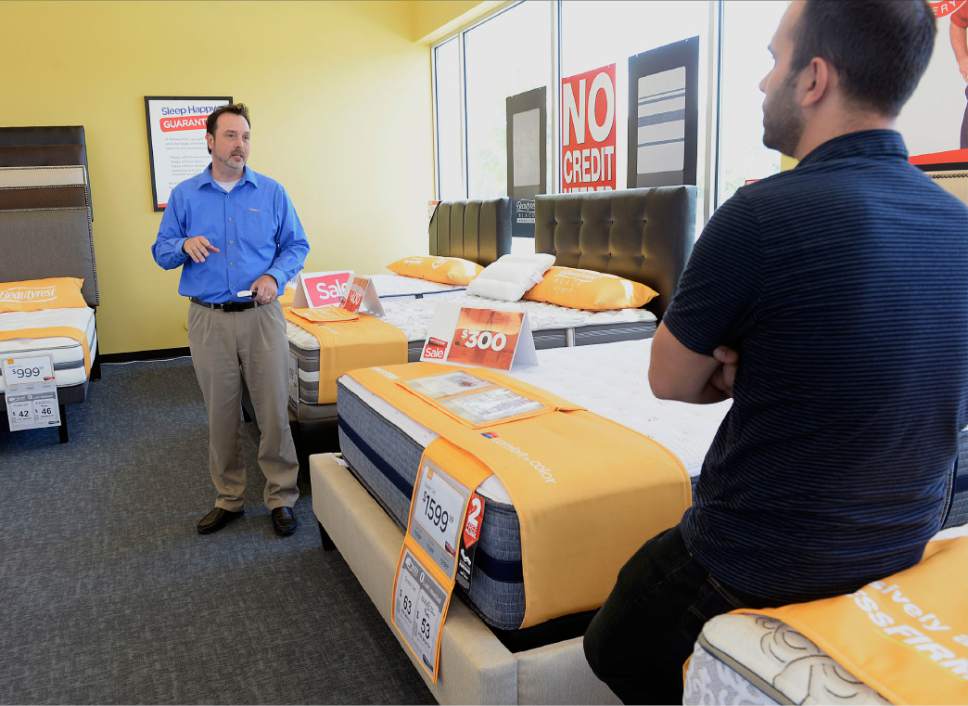This is an archived article that was published on sltrib.com in 2017, and information in the article may be outdated. It is provided only for personal research purposes and may not be reprinted.
While working at a consumer finance company, Curt Doman and Brent Wilson noticed that 30 to 40 percent of the customers who applied for credit at retailers would be turned down — and they figured those shoppers then turned to rent-to-own stores, like Aaron's or Rent-a-Center.
"We thought, why not just virtualize rent-to-own and let the furniture operator offer it right in their location?" Doman said.
The lease-to-own company they launched in 1999 now has revenues of more than $1 billion a year. With its credit-risk analyzing software, its presence at the cash registers of its partners and its business plan, Progressive Leasing is at the leading edge of a market poised for even more rapid growth, according to analysts.
"There are other players," said John Baugh, managing director of research at Stifel Financial Corp. "They are by far the largest."
The Draper company's services are offered in about 22,000 retail locations in 46 states to consumers who, in Progressive's words, are "credit challenged," including millennials short on cash.
Now, Progressive Leasing is seeking to raise its profile, no longer content to be one of the biggest Utah companies you've never heard of. It has 1,385 employees, with 858 of them in Utah. Its revenue of $1.2 billion in 2016 was a 17.9 percent increase over 2015, and it's projecting revenues of up to $1.5 billion this year.
—
'Save the sale' • In the early days of the company, then known as Progressive Finance, a customer who was turned down for credit at a store would fax in an application, a pay stub and his or her bank history. Underwriters would analyze the information, and the process on average took about 45 minutes.
If approved, shoppers could pick out their purchases and Progressive Finance would buy them at the retail price. The company then leased the goods to the customers until they paid off the lease and owned them.
"You can see why it caught on organically because the value proposition for the retailer and the consumer is pretty compelling," said CEO Ryan Woodley. "For the retailers, it was as easy as 'Save the sale.' For the customer it was, 'Here was a way to complete the purchase that you wanted to make but didn't have access to credit.'"
The fax system evolved into an application that could be filled out at a kiosk or the store's finance desk.
But now, Progressive's new "waterfall application" is integrated into the retailer's cash register or point of sale system and collects financial information there.
If the consumer can't qualify for credit through the first option provided by banks, a second tier of financing is considered. If a consumer isn't approved for either of those, Progressive leasing can be offered.
"So the customer no longer has to apply three separate times," said Woodley. "They apply once and the program will automatically waterfall them, with the appropriate disclosures about the differences in the various offers, to the best option that's available for them."
It takes about five minutes to fill out an online application and two to three seconds for an accept/decline decision from Progressive Leasing.
—
'They've been told no' • This approach, however, leaves Progressive Leasing with a pool of higher-risk customers in what's known as the subprime area of financing. The company employs a team of data scientists and uses what it's learned over 18 years to weed out those who are most likely to miss payments or who are trying to defraud the company.
Its reported default rate is 10 percent, though that may not be that bad, considering the credit history of its customers. But the company also counts on repeat customers who appreciate having another choice when they're turned down for credit.
"A third of the population is credit challenged," said Blake Wakefield, the company's president and chief revenue officer. "They don't have options. They've been told no time in and time out."
So when they lease once through Progressive, they'll want to do it again for other items and will work to maintain a good track record with the company, he said.
More than 40 percent of its customers are millennials who chose Progressive because of how it structures its deals, said Woodley.
If consumers complete their 12-month lease, they pay roughly double the retail cost of the item. But around half of Progressive's customers take advantage of other offers. A 90-day alternative allows customers to buy out the lease at the retail cost of the item plus a fee that's typically about $50.
That helps people who, for example, might want to take advantage of holiday sales but won't have the cash until later.
And if circumstances change, like the loss of a job, customers can call and cancel the lease and won't owe more than the current monthly payment. The company, which has an A+ rating from the Better Business Bureau, will pick up the leased item from the home.
—
'You'll see Progressive become bigger' • Progressive needed access to capital to demonstrate to retailers that it had the capacity to serve them, and needed business sites that could pick up items from canceled leases. In 2014, it was acquired by Aaron's, a traditional rent-to-own business based in Atlanta that then had about 2,000 brick-and-mortar locations.
Progressive's revenues accounted for 37.5 percent of Aaron's revenues in 2016.
"Next year, you'll see Progressive become bigger" than the core Aaron's business, said David Magee, an analyst with SunTrust Robinson Humphrey, who puts annual revenues of the rent-to-own industry around $4 billion to $5 billion. Because of its technology, experience and management, Progressive leads the field over competitors like Rent-a-Center, he said.
Company officers now want to change Progressive's "humble and hungry," no-name-on-its-office-building approach to something a lot more visible.
Part of the reason is, with its rapid expansion, Progressive has a "huge need for talent," Woodley said. And there's more room for growth.
Woodley sees $25 billion of potential revenue for the lease-to-own industry just in the areas Progressive now serves, which include furniture, jewelry, mattresses, appliances, electronics, car audio, tires and wireless phone carriers.
"Beyond that there's certainly adjacent markets, adjacent geographies and other opportunities we can tackle," he said. "But today I think we're got a lot of good work cut out for us."









